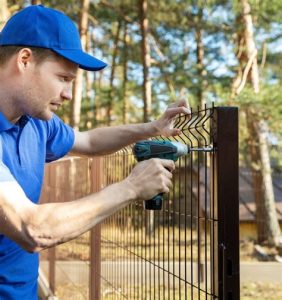Explore Florida fence regulations, types of licenses, application processes, training requirements, and maintenance tips for successful fencing services in the state.When it comes to installing or repairing fences in Florida, understanding the legal requirements is crucial for both contractors and homeowners. The state has specific regulations and licensing requirements to ensure that fence installations are safe, compliant, and of high quality. In this blog post, we will delve into the various aspects of Florida’s fence licensing landscape, providing you with essential information on the regulations governing fence construction. We’ll explore the types of fence licenses available, guide you through the application process, outline the necessary training and education, and discuss the maintenance and renewal of your fencing license. Whether you’re a seasoned professional or a DIY enthusiast, being informed about Florida’s fence license requirements will empower you to make educated decisions for your projects. Let’s get started!
Understanding Florida Fence Regulations
When it comes to installing a fence in Florida, it is crucial to be aware of the regulations that govern such activities. Each municipality in Florida may have its own set of rules regarding fence height, materials, and placement. Before you embark on your fencing project, it’s essential to research and understand these local guidelines.
In general, Florida law dictates that fence regulations are primarily determined by city or county ordinances. Common aspects regulated include setback requirements, which specify how far a fence must be from the property line, as well as height limitations for various types of fences.
Additionally, some neighborhoods may enforce homeowners’ association (HOA) rules that can impose stricter regulations than local ordinances. It is advisable to check with your local planning or building department for specifics. Understanding these various aspects will help you avoid any potential disputes with neighbors or local authorities.
| Aspect | Possible Regulations |
|---|---|
| Height Limits | Usually 4 to 6 feet, depending on the zone |
| Setback Requirements | Often between 0 and 5 feet from the property line |
| Materials | Wood, vinyl, chain link, etc., but may require approval |
Overall, taking the time to understand Florida’s fence regulations not only aids in compliance but also ensures a smoother installation process.
Types of Fence Licenses in Florida
In Florida, the types of fence licenses are primarily categorized based on the scope of work and the specific types of fences being installed. Understanding these distinctions is crucial for anyone looking to operate legally in the fencing industry. Below is a breakdown of the main types of fence licenses available in Florida.
| License Type | Description |
|---|---|
| General Contractor License | This license allows contractors to undertake a wide range of construction and installation projects, including fencing. It requires meeting specific educational and experience standards. |
| Specialty Contractor License | Specialty licenses are geared towards contractors who focus on niche areas within the fencing industry, such as wood fences, vinyl fences, or chain link fences. |
| Residential Contractor License | Holders of a residential contractor license can perform fencing installations specifically for residential properties, ensuring compliance with local regulations. |
| Commercial Contractor License | This license is for contractors who intend to work on commercial properties, providing services that meet the stricter standards often required in these environments. |
In addition to understanding the specific types of licenses, applicants must also consider state and local regulations that may influence their licensing requirements. For instance, some jurisdictions may require separate permits for different types of fencing materials or installations.
Moreover, obtaining the appropriate license helps protect both the contractor and the clients. It ensures that the work meets safety standards and complies with local building codes, ultimately contributing to the quality and durability of the fencing installations.
As the fencing industry continues to evolve, staying updated about any changes in licensing requirements is essential for success. This proactive approach not only aids in compliance but also enhances reputation in a highly competitive market.
Application Process for Fence Licenses
Applying for a fence license in Florida involves several key steps that ensure compliance with state regulations and local codes. Understanding the application process can help streamline your project and avoid unnecessary delays.
Firstly, you will need to gather the required documentation, which typically includes proof of identity, previous work experience or qualifications, and potentially a detailed project plan. Depending on your locality, you may also need to submit specific forms and pay an application fee.
| Step | Description |
|---|---|
| 1 | Gather Required Documents |
| 2 | Complete the Application Form |
| 3 | Submit Application and Fees |
| 4 | Schedule an Interview (if necessary) |
| 5 | Receive License Approval |
Once your application is submitted, it will be reviewed by the relevant licensing authority. This review period can vary, so it’s crucial to apply early. If any additional information is needed, you may be contacted directly. Upon successful review, you will be issued your fence license, which permits you to legally perform fencing work in Florida.
In summary, the application process for a fence license in Florida requires careful preparation and attention to detail.
Training and Education Requirements
In Florida, obtaining a fence license involves meeting certain training and education requirements. These prerequisites ensure that licensed professionals possess the necessary skills and knowledge to perform fence installation and maintenance safely and effectively.
Typically, candidates are required to complete specific educational courses related to fence installation, safety protocols, and state regulations. These courses often cover a variety of topics including zoning laws, fencing materials, installation techniques, and customer service skills.
| Training Component | Description |
|---|---|
| Safety Protocols | Training on safety measures during installation to prevent accidents. |
| Florida Fence Laws | Understanding state regulations related to fencing projects. |
| Installation Techniques | Hands-on training on proper fence installation methods. |
| Material Knowledge | Learning about different types of fencing materials and their applications. |
Additionally, after completing the required courses, candidates may need to pass a written examination to demonstrate their understanding of the material. This examination tests their knowledge on various aspects of fence installation and ensures they are well-prepared to navigate actual work scenarios.
Continuing education is also encouraged for licensed fence professionals. Staying updated on new technologies, materials, and regulations is crucial in this ever-evolving industry.
Renewal and Maintenance of Fence Licenses
In Florida, maintaining your fence license is crucial for ensuring compliance with state regulations. The renewal process for a fence license typically occurs every two years, requiring license holders to stay updated on any changes in local and state laws that could impact their work.
The requirements for renewal may include submitting proof of continuing education, paying renewal fees, and possibly providing evidence of work experience during the licensing period. It’s important to stay organized and proactive to prevent any lapse in your licensing status.
Additionally, maintaining your fence license isn’t just about renewal; it’s also about adhering to good business practices. This includes regularly updating your knowledge on the latest fencing materials, installation techniques, and safety regulations. By doing so, you not only ensure your license remains valid but also enhance your reputation as a knowledgeable and trustworthy fence contractor.
Frequently Asked Questions
What are the basic licensing requirements for fence contractors in Florida?
In Florida, fence contractors are typically required to obtain a contractor’s license, which can include registering as a Specialty Contractor. Applicants must provide proof of experience, pass a licensing exam, and meet local and state registration requirements.
Do I need a license to install a residential fence in Florida?
Yes, in Florida, a license is generally required to install residential fences, especially if the project exceeds a specified value. Always check with local regulations, as requirements can vary by county.
What documents do I need to apply for a Florida fence contractor license?
To apply for a Florida fence contractor license, you typically need a completed application, proof of experience, proof of liability and workers’ compensation insurance, and documentation of passing relevant exams.
Is there a difference between a fence contractor’s license and a general contractor’s license in Florida?
Yes, a fence contractor’s license is a type of specialty contractor license specific to fencing. In contrast, a general contractor’s license covers a broader range of construction and building projects.
How often do I need to renew my fence contractor license in Florida?
In Florida, contractor licenses generally need to be renewed every two years. Continuing education and proof of current insurance are usually required for renewal.
Can I apply for a fence contractor license if I’m new to the industry?
Yes, new entrants can apply for a fence contractor license in Florida, but they must demonstrate relevant experience or complete a qualifying education program, depending on the local requirements.
What penalties might a contractor face for operating without a license in Florida?
Operating without a proper license in Florida can lead to significant penalties, including fines, requirement to cease work, and potential legal action. Additionally, the contractor may risk losing their ability to obtain a license in the future.





